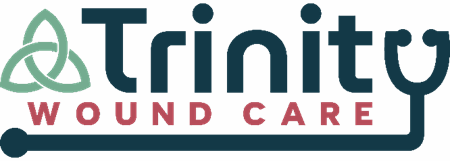
CNA vs PCA: Understanding the Key Differences
Highlights:
- CNAs provide essential medical care, while PCAs focus on non-medical support, each fulfilling different but vital roles in patient care.
- CNAs receive more comprehensive training and are equipped to handle tasks like wound care and vital sign monitoring, whereas PCAs assist with daily living activities and companionship.
- Trinity Wound Care emphasizes the superior training of CNAs over PCAs to ensure the highest standard of care for wound patients.
CNA vs PCA: Understanding the Key Differences
Navigating the world of healthcare can often feel like deciphering a complex maze, especially when it comes to understanding the myriad roles and responsibilities involved.
For wound care patients seeking support, grasping the differences between Certified Nursing Assistants (CNAs) and Patient Care Assistants (PCAs) is crucial. Both play vital roles in healthcare settings, yet their responsibilities, training, and career paths differ significantly.
In this blog post, we’ll demystify the distinctions between CNAs and PCAs, shedding light on each role’s unique responsibilities and how they contribute to patient care. Whether you’re considering a career in healthcare or want to understand who might best meet your needs, this guide aims to equip you with the knowledge to make informed decisions.
Roles and Responsibilities of Certified Nursing Assistants (CNAs)
Certified Nursing Assistants (CNAs) are the backbone of healthcare teams, providing essential medical care to patients under the supervision of registered nurses (RNs) or licensed practical nurses (LPNs). Their primary responsibilities include assisting patients with daily living activities—such as bathing, dressing, and grooming—ensuring that patients maintain their dignity and comfort.
CNAs not only aid with personal care but also play a crucial role in patient monitoring. They are responsible for taking vital signs, administering medications, and performing wound care. Their ability to detect changes in patient conditions and communicate effectively with nursing staff ensures the delivery of timely and precise care.
Patient Care Assistant (PCA) Roles and Responsibilities
Patient Care Assistants (PCAs), on the other hand, focus on providing non-medical support to patients. Their duties revolve around assisting patients with personal hygiene, meal preparation, and light household chores, ensuring that patients maintain a comfortable living environment. PCAs are known for delivering one-on-one care, emphasizing comfort and emotional support.
PCAs often work with the same clients for extended periods, which allows them to build meaningful relationships. Their focus on providing companionship and assisting with everyday tasks makes them ideal caregivers for the elderly and individuals needing long-term assistance in maintaining a comfortable and independent lifestyle.
Educational and Training Requirements
To become a Certified Nursing Assistant, individuals must undergo formal training through community colleges, vocational schools, or technical schools. This educational path equips CNAs with the necessary knowledge and skills to provide quality medical care, including infection control and medical equipment operation. Upon completing their training, CNAs must pass a state licensing exam to become certified, ensuring they meet the rigorous standards required for the role.
In contrast, Patient Care Assistants may not need as extensive training. While some PCAs only require a high school diploma or GED, others may opt for certification programs or vocational training. Though their tasks are less medically oriented, PCAs still play an essential role in maintaining the daily comfort and well-being of their patients.
Work Experience and Scope
The work experience and scope of practice for CNAs and PCAs differ significantly, aligning with their respective educational backgrounds and job responsibilities. CNAs have a broader scope of practice, encompassing more medical-oriented tasks such as taking vital signs, administering medications, and performing wound care. This medical focus allows CNAs to work with patients of all ages, addressing a wide range of healthcare needs.
PCAs, meanwhile, concentrate on providing personal care and emotional support. Their role is more centered on ensuring patient comfort and assisting with daily living activities. They often work in environments where building personal rapport and providing continuous support is key.
Skills and Qualities Required for Success
Both CNAs and PCAs require a unique set of skills and qualities to excel in their roles. Interpersonal skills are paramount, as caregivers must connect with patients and their families, gaining their trust and ensuring effective communication. Time management skills are also essential, allowing CNAs and PCAs to balance multiple tasks and responsibilities efficiently.
In addition to soft skills, CNAs must possess a sound understanding of medical procedures such as infection control and wound care. This combination of technical knowledge and personal dedication ensures that they can provide comprehensive care to their patients in both medical and personal aspects.
Career Advancement Opportunities for Certified Nursing Assistants
Certified Nursing Assistants who wish to advance their careers have several options available to them. With additional education and training, CNAs can become licensed practical nurses (LPNs) or registered nurses (RNs), taking on more responsibilities and potentially increasing their earning potential. Specializing in a particular area of healthcare, such as gerontology or pediatrics, is another avenue for career growth, allowing CNAs to focus on areas they are passionate about.
For Patient Care Assistants, advancing to become a CNA or Home Health Aide (HHA) is a possibility. Further education not only enhances their skillset but also opens up more career options in the healthcare industry.
Choosing Between CNA and PCA Roles
Deciding between a career as a CNA or PCA requires careful consideration of one’s career goals and interests. CNAs receive more formal training and engage in medical-oriented tasks, offering more career advancement opportunities and the potential to specialize in specific areas of healthcare. This path is ideal for individuals interested in pursuing a long-term career in the medical field.
PCAs, with a focus on personal care and companionship, may find their work more emotionally fulfilling, especially if they enjoy building strong bonds with patients. This role is ideal for individuals seeking flexibility and the opportunity to work closely with clients over time.
Why Trinity Wound Care Uses CNAs
At Trinity Wound Care, we recognize the importance of providing high-quality care to our patients, particularly those requiring wound care and assistance with activities of daily living (ADL). For this reason, we employ Certified Nursing Assistants (CNAs) instead of Patient Care Assistants (PCAs). CNAs possess superior training and expertise, allowing them to handle wound care and other medical tasks with precision and compassion.
By choosing CNAs, we ensure that our patients receive expert care tailored to their specific medical needs. Whether it’s wound care or helping with daily activities, Trinity Wound Care prioritizes comprehensive, high-standard service by employing highly trained professionals.
Conclusion
Both CNAs and PCAs play essential roles in the healthcare industry, providing quality care and support to patients across various settings. Understanding the key differences between these roles can help individuals make informed decisions about their career paths, aligning their skills, interests, and goals with the opportunities available to them.
For wound care patients, selecting the appropriate caregiver is crucial for receiving the best possible care. By considering the unique responsibilities and expertise of CNAs and PCAs, patients and their families can choose the right professional to meet their needs, ensuring a positive and supportive healthcare experience.
Schedule an Appointment Today!
At Trinity Wound Care, our Certified Nursing Assistants offer expert wound care and assistance with daily living activities, ensuring the highest standard of care for each patient.
If you or a loved one requires professional wound care, trust Trinity Wound Care to deliver compassionate, specialized support. Reach out to us today to learn more about our services and how we can help you on your healing journey.
Contact Us Today
Frequently Asked Questions
What is the main difference between a CNA and a PCA?
A CNA provides medical care such as wound care and monitoring vital signs, while a PCA assists with personal care and daily activities, offering non-medical support.
Why does Trinity Wound Care prefer CNAs over PCAs?
Trinity Wound Care employs CNAs due to their advanced training in wound care and medical tasks, ensuring patients receive the highest standard of care.
Can a PCA administer medications?
Generally, no. PCAs do not typically handle medical tasks like administering medications, which are usually performed by CNAs or licensed nurses.
Is there a difference in the cost of hiring a CNA vs. a PCA?
The cost may vary, with CNAs often commanding higher wages due to their advanced medical training compared to PCAs.
Can a CNA become a nurse?
Yes, many CNAs advance their careers by pursuing further education and becoming licensed practical nurses (LPNs) or registered nurses (RNs).


